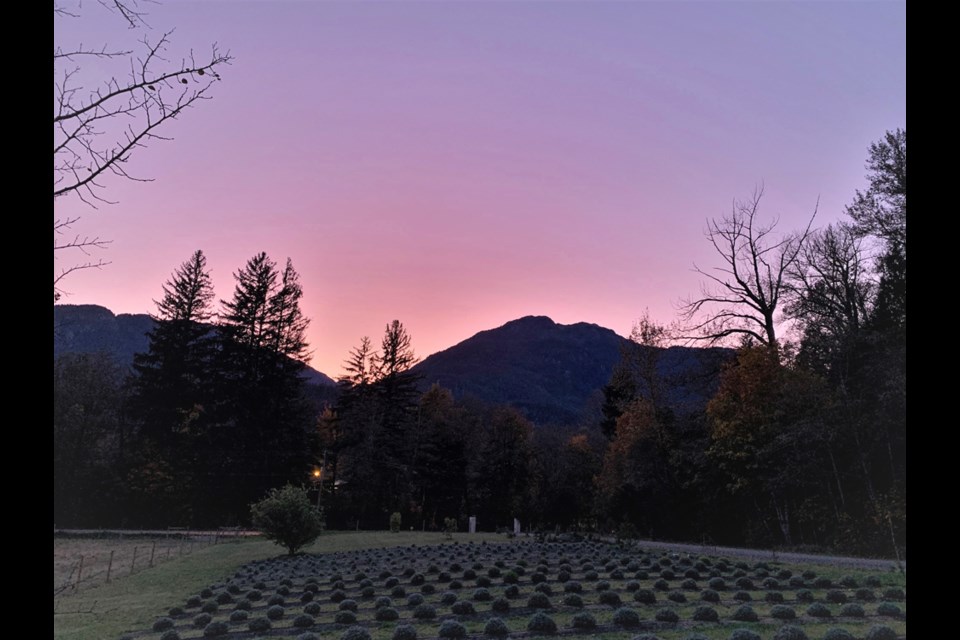Garibaldi Village centre is just beyond the seven-acre property of the family-run farm, but it might as well be a world away.
The Chief sat down with Anita and Sara Heidenreich, who are aunt and niece, to learn more about the farm that many likely drive past but may not know a lot about.
“It is kind of neat because it is the sort of the yin and yang of what is happening [in Squamish],” said Anita referring to how development has occurred all around them.
If this land could talk, it could tell stories of a Squamish that is now just a memory.
The property was bought in 1976 for $70,000, and the property taxes were $105.
The Heidenreichs have been in Squamish for three generations, and the importance of family is at the heart of everything they do.
Each member contributes to the farm and its businesses in their own way, with the adults also balancing full-time jobs.
Their specialty is growing and producing lavender products, thus the farm’s name.
“You have to really love it because otherwise, you wouldn’t do it,” said Anita, adding that other relatives and friends, too, have been more than willing to help out.
“You need the support from friends and family and the community to support local,” said Sara.
There are eight third-generation, four-second generation, and four first generations involved with the farm.
The youngest generation of grandkids come and help out whenever they can, stopping in after school to collect eggs.
The farm also is home to bee colonies, 37 chickens, two pigs, two goats, two black Angus cross cows, Phoebe and Elsa, three dogs, and some cats.
“It is a good lifestyle for them to have that opportunity,” said Sara. “We definitely have that circle of life. We have had those talks. There are a lot of educational opportunities for them here.”
Circles of life on the farm
The family prides itself on running the farm to be as self-sustaining as possible.
They use creative crop rotation and recycle wood for new projects whenever possible, for example.
“It makes sense,” the women said in unison.
The essential oils are extracted onsite using a stainless steel still crafted by Anita and Brad’s son Kalen Heidenreich, who is also in charge of the bees and the pigs.
The property has been in the family since the 1970s. It started as a lavender farm and, since 2018, has been re-established as one.
“That is where it all started, and then it just sort of evolved,” said Anita Heidenreich. “We wanted to do something to kind of get into farming something and taking the property back because it is agricultural land.”
The property has a dry bank that is perfect for lavender.
They started with a couple of rows of lavender and grew from there.
In addition to the lavender oils, they have branched out to Douglas fir oil and yellow cedar oils.
Most recently, they created lemon and orange essential oils.
Their monthly egg program, where locals can sign up for farm-fresh eggs — was full within a few weeks of launching it, Sara said.
Farm to bottle
“From growing it on the fields to bottling it in the bottles is done right here,” said Sara.
The beeswax from their bees is used in their handmade candles, lavender lip balms, and lavender salves.
Last year was a tough year for bees in B.C., and the family lost some of their colonies.
They recently received new bees from Australia.
They also sell handmade goat’s milk soaps made by Sara’s cousin Lecia Marie Heidenreich, who also makes the candles.
COVID factor
Due to COVID-19 restrictions, many of the ways Lavendel successfully sold products, such as a farm stand and pop-up shops, had to be postponed or cancelled.
Still, they market through their social media sites and have managed to keep the businesses going.
“When COVID wasn’t an issue, we [did] farm gate sales as often as possible and will continue on with that when able to,” said Sara.
Skin Focus Squamish also sells Lavendel products from its downtown office.
Challenges
“We basically just jumped in with two feet with everything,” said Anita. “So it was a whole learning curve. As far as challenges, one of our challenges... is everything we want hay or feed or anything, it is out to the valley or out to Pemberton.”
There isn't anywhere close to go get hay or feed, for example, as there would be in a more rural community.
But on the other hand, a real advantage of being a farm family in Squamish is that there is a real bond with other farm businesses in town.
“There is only a few of us, so if we have questions, it is not a competition... it is helping each other out when needed," said Sara.
Hop Creek Farms are neighbours, so that has been a plus, and Stony Mountain Farm in the Squamish Valley have lent the family a hand as needed, the women said.
Farming forward
One of the family’s longer, post-COVID-19 plans is to get into agro-tourism and have public spaces where people can come and have a picnic, for example.
“Down the road, our plan is to have more of a permanent farm stand and more animals. We just want to be open on the weekends to the community," Sara said.
The women said that they have had a ton of positive feedback from locals who see the progression of the farm and comment on their social media or buy from them.
Both said they want to thank the community for supporting them.
“It is a really big deal for us, and we just appreciate the shares and the likes and then purchases,” Sara said.



